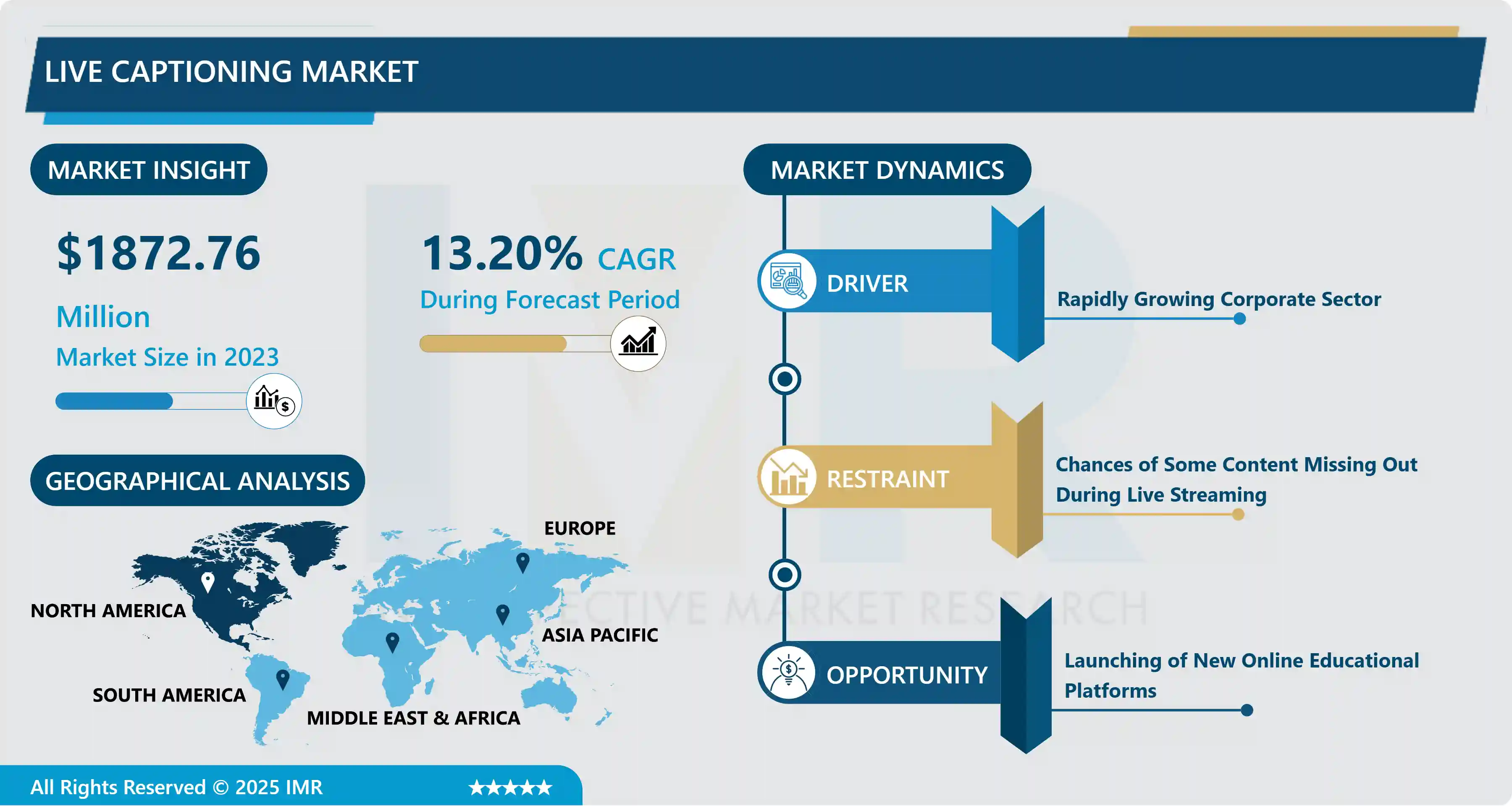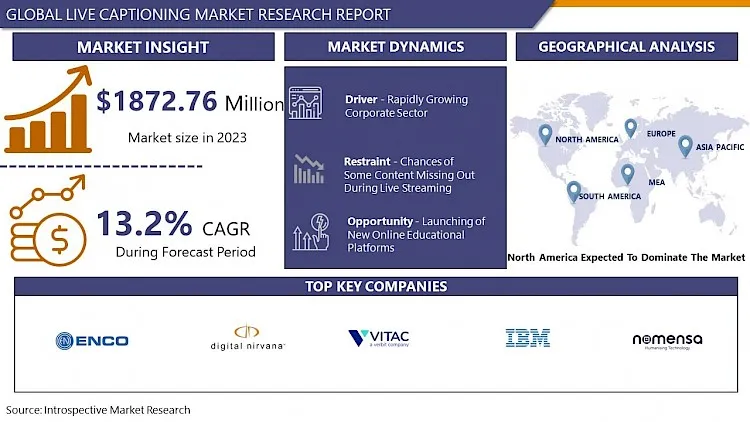Global Live Captioning Market Overview
Live Captioning Market Size Was Valued at USD 1872.76 Million in 2023 and is Projected to Reach USD 5716.1 Million by 2032, Growing at a CAGR of 13.2 % From 2024-2032.
Captions were established in the early 1970s to assist deaf and hard-of-hearing TV viewers; by the 1980s, they had become a mandatory requirement for broadcast television in the United States. Displaying the text on a screen or monitor after converting it from the audio content of a webcast, television show, film, live event, and other productions are called captioning. This allowed deaf or hard hearing individuals to gain full access to media materials that would otherwise be inaccessible. Captions are an integral part of the learning process for deaf and hard-of-hearing pupils. It is certainly worth libraries' and educators' time and effort to find and provide quality captioned material to patrons and learners. Captions are also important in certain scenarios where background noise is more. Captioning has also helped corporate sectors to conduct meetings more efficiently during the pandemic period. Live captioning majorly employs two technologies stenography and Automated Speech Recognition. Currently, 360 million people are suffering from hearing loss, and this number is expected to increase in the coming future thus, supporting the growth of the live captioning market in the forecast period.


Market Dynamics And Key Factors For Live Captioning Market
Drivers:
The rapidly growing corporate sector
- Corporate sectors have tremendously grown over the past few years. Many organizations have a global presence, and when it comes to global meetings, they utilize live captioning to bridge the communication or language gap. Live captioning has helped corporate communicators to directly connect with their employees and make them feel a part of the corporate community. Many countries in the world speak English as a second language (ESL), thus by providing written words to match the language spoken in a video ESL speakers can understand the content better. Workplaces such as sales training, department meetings, and town-hall meetings can be streamed with live captions. Moreover, live captioning service can be trained to recognize company names, product names, and employee names to improve accuracy.
The growing usage of social media
- Social media has become the largest platform in recent years to stream live video games, events, and launch new products. People are more active on social media accounts, and an average user has spent nearly 145 minutes on social media in 2020, according to a report by Statista. Social media has become a popular platform for organizations to launch new products. This is achieved by collaborating with social media influencers, who have a large fan following. This trend is growing and many businesses have adopted it. Thus, during a live launch of a new product, live captioning can help the viewers to understand the video and stay enthralled till the end of the video. Furthermore, live captioning can also help celebrities to connect with their worldwide fans thus, driving the growth of the live captioning market in the projected period.
Restraints:
- The chances of some content missing out during live streaming are the factor that can hamper the expansion of the live captioning market in the forecasted timeframe. For instance, live captioning during music concerts can have issues, mainly due to the background noise of instrumental music playing alongside lyrics and crowd noises. Live captioning during corporate meetings, online lectures, and training can also be affected due to any substantial background noise that can reduce the clarity of spoken word.
- Another disadvantage of live auto-captioning is that many providers rely on their proprietary ASR technology, many of which has not been regarded as a competitor in the ASR market or have not been extensively evaluated externally. As a result, many live auto-captioning systems may not be a dependable or highly accurate alternative; for example, automated captions might typically have an accuracy rate of less than 50%.
Opportunities:
- The COVID-19 pandemic has forced a large number of individuals to work from home as well as many educational institutes have adopted the new normal of online lectures. Language can be a barrier during online lectures as there is a chance that pupils can't comprehend the content displayed in the video. Many institutes around the globe have started offering online educational services such as edX, Coursera, BYJU'S, WhiteHat, and many others. Many of these have online lectures thus, online captioning can help the viewers to perceive the knowledge depending on their regional language spoken. For this service providers have started offering tailored programs that can display captions according to requirement.
- The popularity of video games has skyrocketed in recent years. Moreover, the majority of ace players live to stream their gameplay, and the number of viewers is also very high. According to VITAC, Twitch is the world's most popular social video network and community for gamers, video game culture, and the creative arts. Every day, about 10 million people gather to watch and discuss video games with over 2 million streamers. This number is expected to set new records every day with the increasing penetration of the internet. In addition, many other such platforms can reap the benefits of live captioning by offering live captioning during streaming. On the Twitch platform, streamers do not have to use any software for generating captions this gaming channel transmits caption files embedded in their streams or via their broadcast encoders. The growing popularity of live streaming is expected to create a profitable opportunity for the market players.
Market Segmentation
Segmentation Analysis of Live Captioning Market:
- Depending on the application, the corporate sector is anticipated to have the highest share of the live captioning market in the forecast period. According to a report by IBM, live captions are utilized by 62% of the employees for work-related video content for reasons other than hearing accessibility. Only 5% of the users need captions or subtitles because they have hearing issues. Other reasons include convenience, watching films with low or no volume, and non-native speakers who require help understanding the language spoken in the video. Furthermore, when a video is live captioned, employees are 80 percent more likely to view it all the way through. As a result, there is genuine value in captioning video material, and it is a driving force for corporations seeking to boost audience engagement thus, strengthening the growth of the corporate segment.
- Depending on the type, the ASR segment is expected to develop with the highest CAGR due to the growing advancement in technology. Automated Speech Recognition technology can deliver accurate captioning during live events without the intervention of a human. Several companies have invested a huge fortune in developing this novel technology. Moreover, ASR is more affordable for live conferences and lectures as compared to human-powered live captioning. Automatic captions also offer the unique ability to reduce deletion mistakes (missing words from the live stream), which are typical in professional live captioning solutions. ASR technology, on the other hand, can pick up every word from a live feed with little delay thus, propelling the growth of the live captioning market.
Regional Analysis of Live Captioning Market:
- The North American region is anticipated to have the highest share of the live captioning market in the forecast period. The growth in this region can be attributed to the presence of leading market players and the ready adoption of new technologies by the different sectors in this region. According to Rev, more than 85% of Americans watch online videos every week. The survey also concluded that live captioning increased the average time watched by 12% and 80% of Facebook viewers will even complete the video. Individuals in this region have high per capita income thus, the usage of smartphones and other smart devices is more. Work from the home policy of many organizations is expected to bolster the development of the live captioning market in this region.
- The European region is expected to have the second-highest share of the live captioning market during the projected timeframe. The supportive government rules to bridge the gap between deaf candidates and speakers is the main driving force for the development of the live captioning market in this region. More than 10 million in the UK have a hearing impairment. The growing corporate sector and the inclusion of live captioning by educational institutes have strengthened the development of the live captioning market in this region.
- The live captioning market in the Asia-Pacific region is anticipated to develop at the highest CAGR over the forecasted timeframe. The growing graze of live video streaming has fueled the growth of the live captioning market in this region. Live game streaming has several viewers and the streamers usually speak in local languages. The growing global viewers made the streaming platforms incorporate live captioning to bridge the gap between local streamers and global viewers thus, supporting the growth of the live captioning market in this region.
Players Covered in Live Captioning Market are:
- Verbit (USA)
- VITAC (USA)
- CaptionMax (USA)
- Rev.com (USA)
- Ai-Media (Australia)
- 3Play Media (USA)
- Acadecraft Inc. (India)
- Automatic Sync Technologies (USA)
- EEG Enterprises (USA)
- National Captioning Institute (NCI) (USA)
- Take 1 (United Kingdom)
- Vanan Services (USA)
- QuickCaption (USA)
- Steno Media (USA)
- Alternative Communication Services (ACS) (USA)
- ZOO Digital Group (United Kingdom)
- SpokenHere Communications (USA)
- CaptioningStar (USA)
- Way With Words (South Africa)
- Global Listings (United Kingdom)
Recent Industry Developments In Live Captioning Market
- In April 2024, AI-Media, a global leader in end-to-end captioning technology solutions, is excited to announce its newly established partnership with DAZN, the global sports entertainment streaming platform. Through this collaboration, AI-Media will deliver live and recorded multi language and translated captioning using various solutions from its AI-powered LEXI Tool Kit.
- In March 2023, 3Play Media, the leading video accessibility provider, announced today the availability of its live virtual caption encoding solution. The solution, which streamlines the live captioning workflow from listening through delivery, reduces the friction that exists for organizations and ensures an engaging audience experience.
|
Global Live Captioning Market |
|||
|
Base Year: |
2023 |
Forecast Period: |
2024-2032 |
|
Historical Data: |
2017 to 2023 |
Market Size in 2023: |
USD 1872.76 Mn. |
|
Forecast Period 2024-2032 CAGR: |
13.2% |
Market Size in 2032: |
USD 5716.1 Mn. |
|
Segments Covered: |
By Technology |
|
|
|
By Application |
|
||
|
By Region |
|
||
|
Key Market Drivers: |
|
||
|
Key Market Restraints: |
|
||
|
Key Opportunities: |
|
||
|
Companies Covered in the report: |
|
||
Chapter 1: Introduction
1.1 Scope and Coverage
Chapter 2:Executive Summary
Chapter 3: Market Landscape
3.1 Market Dynamics
3.1.1 Drivers
3.1.2 Restraints
3.1.3 Opportunities
3.1.4 Challenges
3.2 Market Trend Analysis
3.3 PESTLE Analysis
3.4 Porter's Five Forces Analysis
3.5 Industry Value Chain Analysis
3.6 Ecosystem
3.7 Regulatory Landscape
3.8 Price Trend Analysis
3.9 Patent Analysis
3.10 Technology Evolution
3.11 Investment Pockets
3.12 Import-Export Analysis
Chapter 4: Live Captioning Market by Technology (2018-2032)
4.1 Live Captioning Market Snapshot and Growth Engine
4.2 Market Overview
4.3 Automated Speech Recognition
4.3.1 Introduction and Market Overview
4.3.2 Historic and Forecasted Market Size in Value USD and Volume Units
4.3.3 Key Market Trends, Growth Factors, and Opportunities
4.3.4 Geographic Segmentation Analysis
4.4 Stenography
Chapter 5: Live Captioning Market by Application (2018-2032)
5.1 Live Captioning Market Snapshot and Growth Engine
5.2 Market Overview
5.3 Broadcast
5.3.1 Introduction and Market Overview
5.3.2 Historic and Forecasted Market Size in Value USD and Volume Units
5.3.3 Key Market Trends, Growth Factors, and Opportunities
5.3.4 Geographic Segmentation Analysis
5.4 Streaming
5.5 Educational Sector
5.6 Corporate Sector
5.7 Others
Chapter 6: Company Profiles and Competitive Analysis
6.1 Competitive Landscape
6.1.1 Competitive Benchmarking
6.1.2 Live Captioning Market Share by Manufacturer (2024)
6.1.3 Industry BCG Matrix
6.1.4 Heat Map Analysis
6.1.5 Mergers and Acquisitions
6.2 AUDINA HEARING INSTRUMENTS (US)
6.2.1 Company Overview
6.2.2 Key Executives
6.2.3 Company Snapshot
6.2.4 Role of the Company in the Market
6.2.5 Sustainability and Social Responsibility
6.2.6 Operating Business Segments
6.2.7 Product Portfolio
6.2.8 Business Performance
6.2.9 Key Strategic Moves and Recent Developments
6.2.10 SWOT Analysis
6.3 SEBOTEK HEARING SYSTEMS (US)
6.4 SIVANTOS (US)
6.5 STARKEY (US)
6.6 ZOUNDS HEARING (US)
6.7 WIDEX (DENMARK)
6.8 WILLIAM DEMANT (DENMARK)
6.9 OTICON (DENMARK)
6.10 MED-EL MEDICAL ELECTRONICS (AUSTRIA)
6.11 SONOVA (SWITZERLAND)
6.12 GN STORE NORD A/S (DENMARK)
6.13 HORENTEK HEARING DIAGNOSTICS (ITALY)
6.14 AMPLIFON (ITALY)
6.15 ARPHI ELECTRONICS (INDIA)
6.16 RION (JAPAN)
6.17 COCHLEAR (AUSTRALIA)
Chapter 7: Global Live Captioning Market By Region
7.1 Overview
7.2. North America Live Captioning Market
7.2.1 Key Market Trends, Growth Factors and Opportunities
7.2.2 Top Key Companies
7.2.3 Historic and Forecasted Market Size by Segments
7.2.4 Historic and Forecasted Market Size by Technology
7.2.4.1 Automated Speech Recognition
7.2.4.2 Stenography
7.2.5 Historic and Forecasted Market Size by Application
7.2.5.1 Broadcast
7.2.5.2 Streaming
7.2.5.3 Educational Sector
7.2.5.4 Corporate Sector
7.2.5.5 Others
7.2.6 Historic and Forecast Market Size by Country
7.2.6.1 US
7.2.6.2 Canada
7.2.6.3 Mexico
7.3. Eastern Europe Live Captioning Market
7.3.1 Key Market Trends, Growth Factors and Opportunities
7.3.2 Top Key Companies
7.3.3 Historic and Forecasted Market Size by Segments
7.3.4 Historic and Forecasted Market Size by Technology
7.3.4.1 Automated Speech Recognition
7.3.4.2 Stenography
7.3.5 Historic and Forecasted Market Size by Application
7.3.5.1 Broadcast
7.3.5.2 Streaming
7.3.5.3 Educational Sector
7.3.5.4 Corporate Sector
7.3.5.5 Others
7.3.6 Historic and Forecast Market Size by Country
7.3.6.1 Russia
7.3.6.2 Bulgaria
7.3.6.3 The Czech Republic
7.3.6.4 Hungary
7.3.6.5 Poland
7.3.6.6 Romania
7.3.6.7 Rest of Eastern Europe
7.4. Western Europe Live Captioning Market
7.4.1 Key Market Trends, Growth Factors and Opportunities
7.4.2 Top Key Companies
7.4.3 Historic and Forecasted Market Size by Segments
7.4.4 Historic and Forecasted Market Size by Technology
7.4.4.1 Automated Speech Recognition
7.4.4.2 Stenography
7.4.5 Historic and Forecasted Market Size by Application
7.4.5.1 Broadcast
7.4.5.2 Streaming
7.4.5.3 Educational Sector
7.4.5.4 Corporate Sector
7.4.5.5 Others
7.4.6 Historic and Forecast Market Size by Country
7.4.6.1 Germany
7.4.6.2 UK
7.4.6.3 France
7.4.6.4 The Netherlands
7.4.6.5 Italy
7.4.6.6 Spain
7.4.6.7 Rest of Western Europe
7.5. Asia Pacific Live Captioning Market
7.5.1 Key Market Trends, Growth Factors and Opportunities
7.5.2 Top Key Companies
7.5.3 Historic and Forecasted Market Size by Segments
7.5.4 Historic and Forecasted Market Size by Technology
7.5.4.1 Automated Speech Recognition
7.5.4.2 Stenography
7.5.5 Historic and Forecasted Market Size by Application
7.5.5.1 Broadcast
7.5.5.2 Streaming
7.5.5.3 Educational Sector
7.5.5.4 Corporate Sector
7.5.5.5 Others
7.5.6 Historic and Forecast Market Size by Country
7.5.6.1 China
7.5.6.2 India
7.5.6.3 Japan
7.5.6.4 South Korea
7.5.6.5 Malaysia
7.5.6.6 Thailand
7.5.6.7 Vietnam
7.5.6.8 The Philippines
7.5.6.9 Australia
7.5.6.10 New Zealand
7.5.6.11 Rest of APAC
7.6. Middle East & Africa Live Captioning Market
7.6.1 Key Market Trends, Growth Factors and Opportunities
7.6.2 Top Key Companies
7.6.3 Historic and Forecasted Market Size by Segments
7.6.4 Historic and Forecasted Market Size by Technology
7.6.4.1 Automated Speech Recognition
7.6.4.2 Stenography
7.6.5 Historic and Forecasted Market Size by Application
7.6.5.1 Broadcast
7.6.5.2 Streaming
7.6.5.3 Educational Sector
7.6.5.4 Corporate Sector
7.6.5.5 Others
7.6.6 Historic and Forecast Market Size by Country
7.6.6.1 Turkiye
7.6.6.2 Bahrain
7.6.6.3 Kuwait
7.6.6.4 Saudi Arabia
7.6.6.5 Qatar
7.6.6.6 UAE
7.6.6.7 Israel
7.6.6.8 South Africa
7.7. South America Live Captioning Market
7.7.1 Key Market Trends, Growth Factors and Opportunities
7.7.2 Top Key Companies
7.7.3 Historic and Forecasted Market Size by Segments
7.7.4 Historic and Forecasted Market Size by Technology
7.7.4.1 Automated Speech Recognition
7.7.4.2 Stenography
7.7.5 Historic and Forecasted Market Size by Application
7.7.5.1 Broadcast
7.7.5.2 Streaming
7.7.5.3 Educational Sector
7.7.5.4 Corporate Sector
7.7.5.5 Others
7.7.6 Historic and Forecast Market Size by Country
7.7.6.1 Brazil
7.7.6.2 Argentina
7.7.6.3 Rest of SA
Chapter 8 Analyst Viewpoint and Conclusion
8.1 Recommendations and Concluding Analysis
8.2 Potential Market Strategies
Chapter 9 Research Methodology
9.1 Research Process
9.2 Primary Research
9.3 Secondary Research
|
Global Live Captioning Market |
|||
|
Base Year: |
2023 |
Forecast Period: |
2024-2032 |
|
Historical Data: |
2017 to 2023 |
Market Size in 2023: |
USD 1872.76 Mn. |
|
Forecast Period 2024-2032 CAGR: |
13.2% |
Market Size in 2032: |
USD 5716.1 Mn. |
|
Segments Covered: |
By Technology |
|
|
|
By Application |
|
||
|
By Region |
|
||
|
Key Market Drivers: |
|
||
|
Key Market Restraints: |
|
||
|
Key Opportunities: |
|
||
|
Companies Covered in the report: |
|
||













